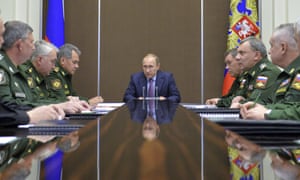Link
The Guardian
More than a month after Russia began airstrikes against targets in Syria, western capitals remain uncertain of Vladimir Putin’s endgame in the country, as the world waits to see what effect, if any, the apparent bombing of a Russian jet in Egypt last week has had.
Officially, Russia has not commented on claims that the plane was brought down over Sinai by a bomb on board. However, the indefinite suspension of all flights to Egypt, as well as Russian tourists being evacuated from the country and having their luggage flown home separately, would seem to point to Russian security services having the same suspicions as voiced by UK and US officials.
Speaking to a conference of international politicians and analysts last month, Putin said Russia’s move in Syria was a pre-emptive strike: “Fifty years ago, the streets of Leningrad taught me one thing: if a fight’s inevitable, you must strike first.”
If the Metrojet crash is indeed shown to be the work of terrorists, then it will pose a new dilemma for Putin. Does he double down on the Syria operations, or instead make a push for the negotiating table holding the hand he currently has?
Washington believes Putin has already bitten off more than he can chew in Syria, and the US government has opted for a “watch them fail” policy, in the hope it will bring about Moscow’s acceptance that Bashar al-Assad must step down as part of any political transition, a senior US official told the Guardian.
“This is the first time they have actually done active combat air support to ground operations, and they overestimated how effective those air operations can be,” the official said. “If you don’t train together, it’s really complex to coordinate air and ground operations. That’s why we think they made a strategic error. They overestimated the capabilities of the Syrian military and they underestimated what an unbelievable mess Syria is.”
In Moscow, some believe Putin’s initial move was largely borne of opportunism, with the Russian leader noting the ineffectiveness of western policy in Syria and seeing a chance to change the discussion and make Russia’s voice heard, as well as distract attention from events in Ukraine.
“Putin is certainly not a strategist, he is a tactician, and the whole history of his rule has shown this. His goals have changed all the time,” said Mikhail Zygar, editor-in-chief of independent Russian TV station Rain, who has just released a book on Putin and his inner circle.
However, a number of sources in Moscow say Putin’s stated aim, of defeatingIslamic State terrorists, should not be ignored, and is likely to be the primary motivation for the intervention, even if the majority of airstrikes have been against non-Isis targets.
“I think the main reason is a real worry about the potential for Isis to pose a threat to Russia in the near future,” said one political insider who knows Putin personally, speaking prior to the Metrojet crash. “We are a lot closer to the region than America is, and we are not as good at defending our borders. Of course, it’s about lots of other things too, including the need to move on the conversation from Ukraine, but I firmly believe this is the main reason.”
Putin’s reign has been characterised by a huge distrust of any protests against autocratic leaders, as well as a visceral reaction to Islamic terrorism. Sir Tony Brenton, who was the British ambassador to Moscow from 2004 to 2008, recalled Putin’s body language changing when the topic turned to terrorism.
Brenton recalled meetings in which British leaders wanted Putin to put pressure on the Uzbek president, Islam Karimov, after a massacre of hundreds of protesters in the town of Andijan in 2005.“Islamism would come up and you would see his eyes harden. His position was that Islamism is a problem you can only deal with using a fist of steel.”
“He said, ‘OK, Karimov might be a bad guy, but the threat of Islamism is much greater for us’.”
This visceral response to terror means Putin may feel he has no option but to double down in Syria if the air crash does turn out to be a bomb. Putin has categorically ruled out any kind of ground mission, but already there are unconfirmed reports of Russian artillery and armour seen far from the airbase at Latakia, and Putin may feel a terror attack vindicates his insistence that Islamic State must be dealt with in Syria.
Western officials have tended to dismiss the “fighting terror” argument because Russia has so obviously targeted groups other than Islamic State. The Americans see Russian talk of Assad’s “legitimacy” as ludicrous and say Russia’s support for him is to ensure a seat at the negotiating table: “Their main card in the diplomatic negotiations was the regime, and if you lose the regime, you lose the ability to shape the negotiations,” said the senior official.
But the view in Russia is that propping up an authoritarian regime is the best way to avoid terror and chaos in the future.
“There was a real danger that the regime would fall,” said Alexander Aksenyonok, a veteran Russian diplomat, who was Soviet charge d’affaires in Damascus during the late 1980s, and has recently taken part in meetings with Syrian opposition figures in Moscow, as well as having informal contact with former US diplomats. “Even among the Americans, there was an understanding that the collapse of the institutions of statehood, however bad the regime might be, was extremely dangerous. It would be the same mistake that happened in Libya and Iraq.”
Washington is waiting to see how Putin responds to the limited success of the military campaign and the potential terror attack. “If they don’t succeed in this air support to ground forces, is Putin going to admit defeat and adjust the negotiating position to be more receptive to front-loading Assad’s departure, or do they keep just grinding away with how they are fighting now, which doesn’t seem like a very good option?” the American official said.Igor Ivanov, Russia’s former foreign minister, said it was clear Assad was not a perfect partner but that Russia prefers to deal with legitimate leaders rather than back opposition groups. “Of course Assad is a difficult partner. There are no easy partners in the Middle East. I worked with Hussein, with Gaddafi, with Assad senior and junior. Name me one country with an easy partner.”
“We are not going to oppose them militarily in their support for Assad, so in that sense, yes, we are going to watch them fail and hope that brings them to reasonable terms and political negotiations.”
If one of Russia’s goals was to ensure a strong hand at the negotiating table, they may have already achieved this. And despite Putin’s show of support for Assad, which extended to inviting him to talks in the Kremlin in October, there are signs that this support may have an expiry date.
“Hafez al-Assad did not like what Gorbachev was doing in Russia with perestroika back then, just as Bashar doesn’t like what Russia is offering him now,” said Aksenyonok. “If Assad really thinks he can continue the fight against terror without starting the political process, he’s making a big mistake. The processes should happen in parallel. Of course, Syria will never be the same as it was, and the leadership will never be the same as it was.”



No comments:
Post a Comment